
OpenBudgeteer is a budgeting app based on the Bucket Budgeting Principle. You can use it for your financial planning. In this step by step guide I will show you how to install OpenBudgeteer on your Synology NAS using Docker & Portainer.
This guide works perfectly with the latest OpenBudgeteer v1.11 release.
STEP 1
Please Support My work by Making a Donation.
STEP 2
Install Portainer using my step by step guide. If you already have Portainer installed on your Synology NAS, skip this STEP. Attention: Make sure you have installed the latest Portainer version.
STEP 3
Go to File Station and open the docker folder. Inside the docker folder, create one new folder and name it openbudgeteer. Follow the instructions in the image below.
Note: Be careful to enter only lowercase, not uppercase letters.
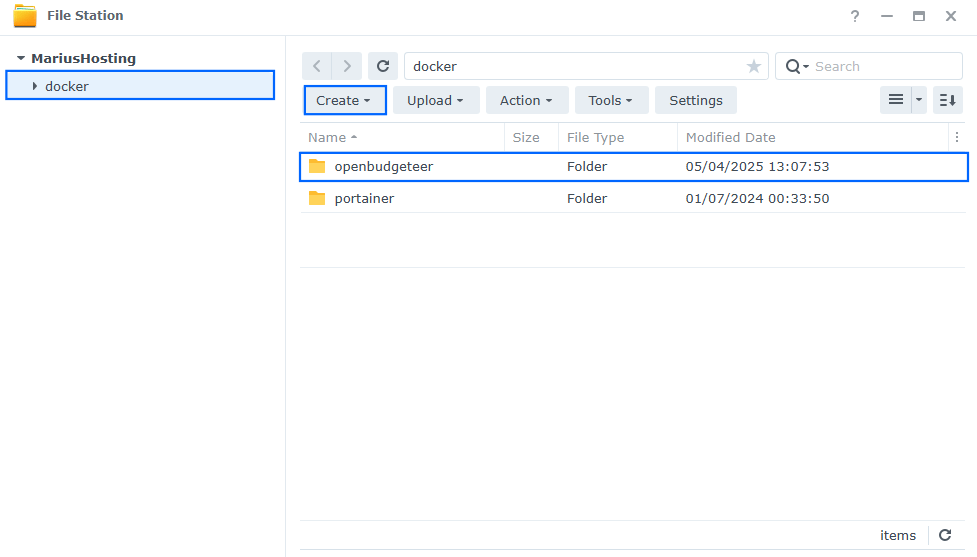
STEP 4
Now create two new folders inside the openbudgeteer folder that you have previously created at STEP 3. Name them db and redis. Follow the instructions in the image below.
Note: Be careful to enter only lowercase, not uppercase letters.
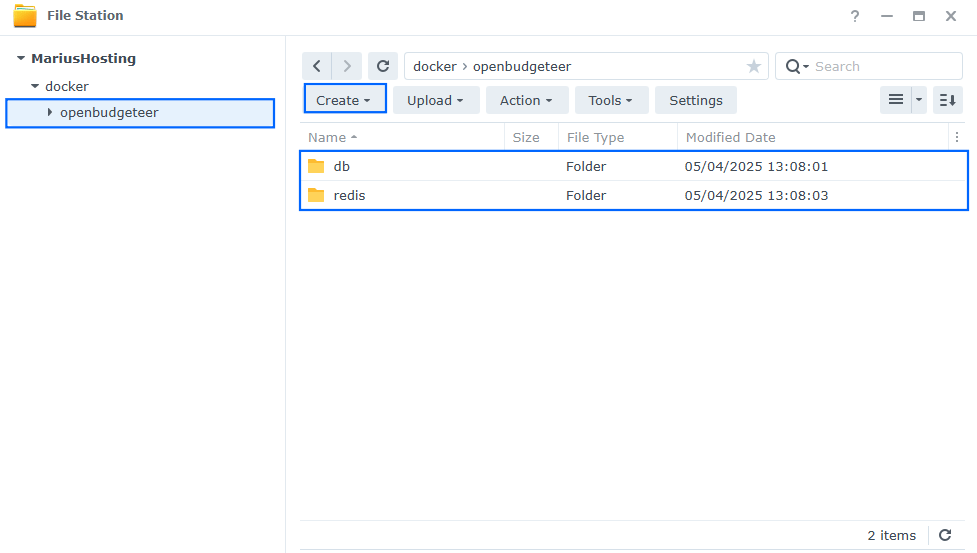
STEP 5
Log into Portainer using your username and password. On the left sidebar in Portainer, click on Home then Live connect. Follow the instructions in the image below.

On the left sidebar in Portainer, click on Stacks then + Add stack. Follow the instructions in the image below.

STEP 6
In the Name field type in openbudgeteer. Follow the instructions in the image below.
services:
mariadb:
image: mariadb:11.8-noble #LTS Long Time Support Until October 15, 2033.
container_name: OpenBudgeteer-DB
security_opt:
- no-new-privileges:false
environment:
MARIADB_DATABASE: openbudgeteer
MARIADB_USER: openbudgeteeruser
MARIADB_PASSWORD: openbudgeteerpass
MARIADB_ROOT_PASSWORD: rootpass
TZ: Europe/Bucharest
volumes:
- /volume1/docker/openbudgeteer/db:/var/lib/mysql:rw
restart: on-failure:5
redis:
image: redis:7
container_name: OpenBudgeteer-REDIS
healthcheck:
test: ["CMD-SHELL", "redis-cli ping || exit 1"]
volumes:
- /volume1/docker/openbudgeteer/redis:/data:rw
environment:
TZ: Europe/Bucharest
restart: on-failure:5
openbudgeteer:
image: axelander/openbudgeteer:latest
container_name: OpenBudgeteer
healthcheck:
test: timeout 10s bash -c ':> /dev/tcp/127.0.0.1/8080' || exit 1
interval: 10s
timeout: 5s
retries: 3
start_period: 90s
ports:
- 6100:8080
environment:
CONNECTION_PROVIDER: mariadb
CONNECTION_SERVER: OpenBudgeteer-DB
CONNECTION_REDIS_SERVER: OpenBudgeteer-REDIS
CONNECTION_PORT: 3306
CONNECTION_DATABASE: openbudgeteer
CONNECTION_USER: openbudgeteeruser
CONNECTION_PASSWORD: openbudgeteerpass
APPSETTINGS_CULTURE: en-US #or https://mariushosting.com/country-codes/
APPSETTINGS_THEME: vapor
depends_on:
- mariadb
- redis
restart: on-failure:5
openbudgeteer-api:
image: axelander/openbudgeteer-api
container_name: OpenBudgeteer-API
healthcheck:
test: ["CMD-SHELL", "nc -z 127.0.0.1 8080 || exit 1"]
interval: 10s
timeout: 5s
retries: 3
start_period: 90s
ports:
- 6101:8080
environment:
CONNECTION_PROVIDER: mariadb
CONNECTION_SERVER: OpenBudgeteer-DB
CONNECTION_PORT: 3306
CONNECTION_DATABASE: openbudgeteer
CONNECTION_USER: openbudgeteeruser
CONNECTION_PASSWORD: openbudgeteerpass
depends_on:
- mariadb
- redis
restart: on-failure:5
Note: Before you paste the code above in the Web editor area below, change the value for TZ. (Select your current Time Zone from this list.)
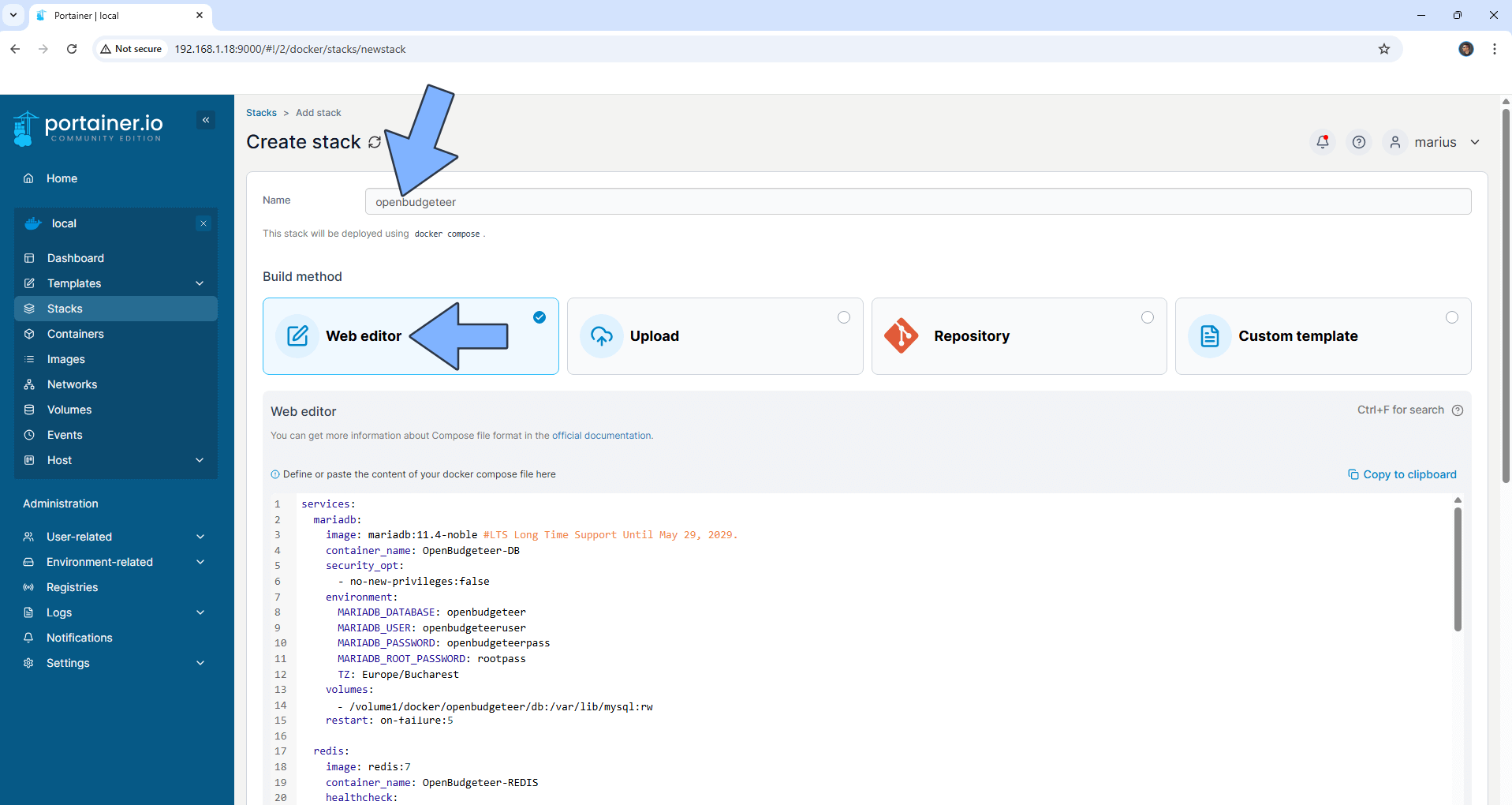
STEP 7
Scroll down on the page until you see a button named Deploy the stack. Click on it. Follow the instructions in the image below. The installation process can take up to a few minutes. It will depend on your Internet speed connection.
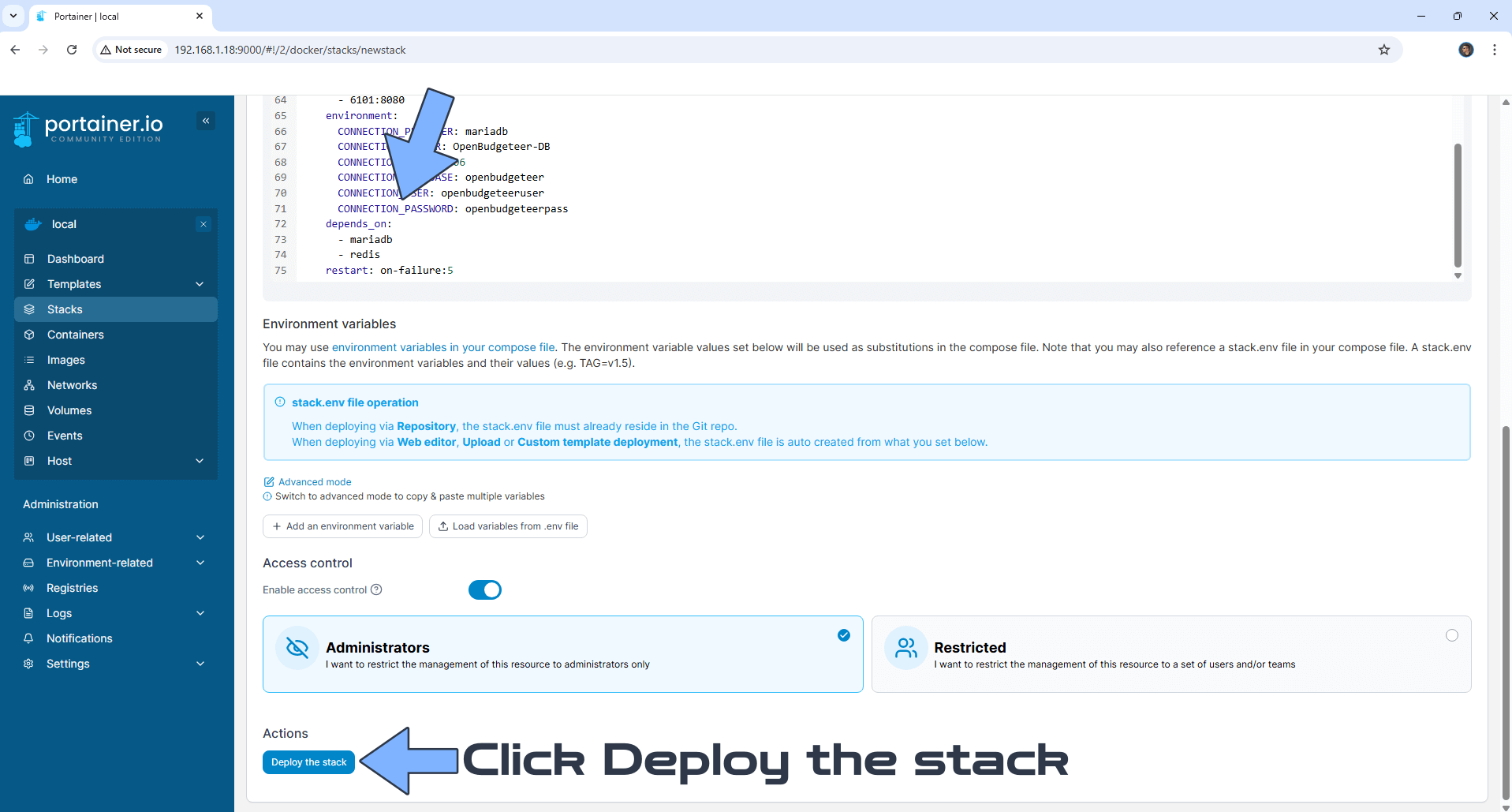
STEP 8
If everything goes right, you will see the following message at the top right of your screen: “Success Stack successfully deployed“.

STEP 9
🟢Please Support My work by Making a Donation. Almost 99,9% of the people that install something using my guides forget to support my work, or just ignore STEP 1. I’ve been very honest about this aspect of my work since the beginning: I don’t run any ADS, I don’t require subscriptions, paid or otherwise, I don’t collect IPs, emails, and I don’t have any referral links from Amazon or other merchants. I also don’t have any POP-UPs or COOKIES. I have repeatedly been told over the years how much I have contributed to the community. It’s something I love doing and have been honest about my passion since the beginning. But I also Need The Community to Support me Back to be able to continue doing this work.
STEP 10
Please wait approximately 5 minutes or you will get a blank page if you try to connect too soon. The installation process can take up to a few seconds/minutes. It will depend on your Internet speed connection. Now open your browser and type in http://Synology-ip-address:6100 On the left sidebar, Click Account, then New account. Type in the name of your account, then click Save. Follow the instructions in the image below.
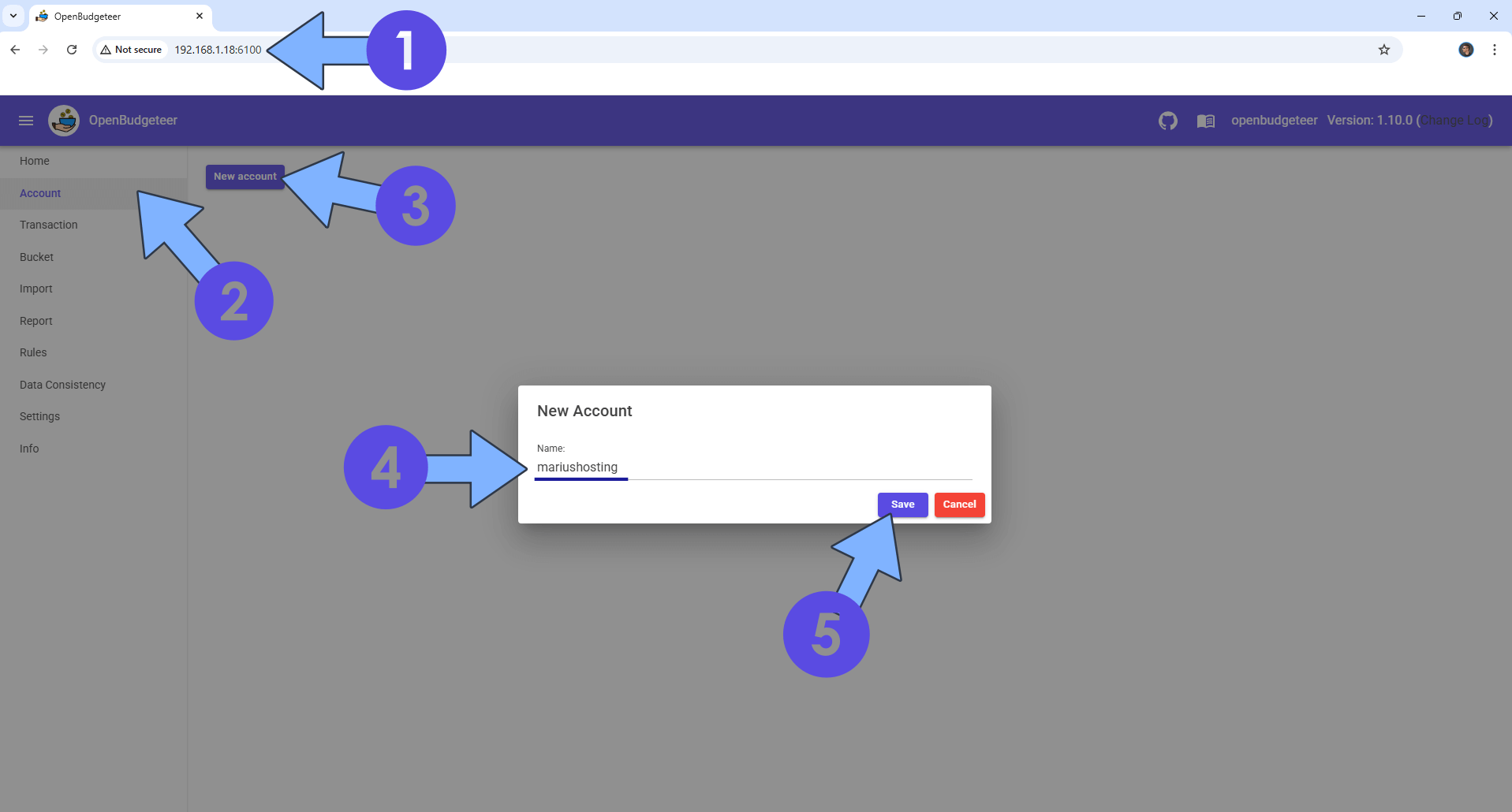
STEP 11
On the left sidebar, click Settings. Switch the theme to Dark, then click Apply Changes. Follow the instructions in the image below.
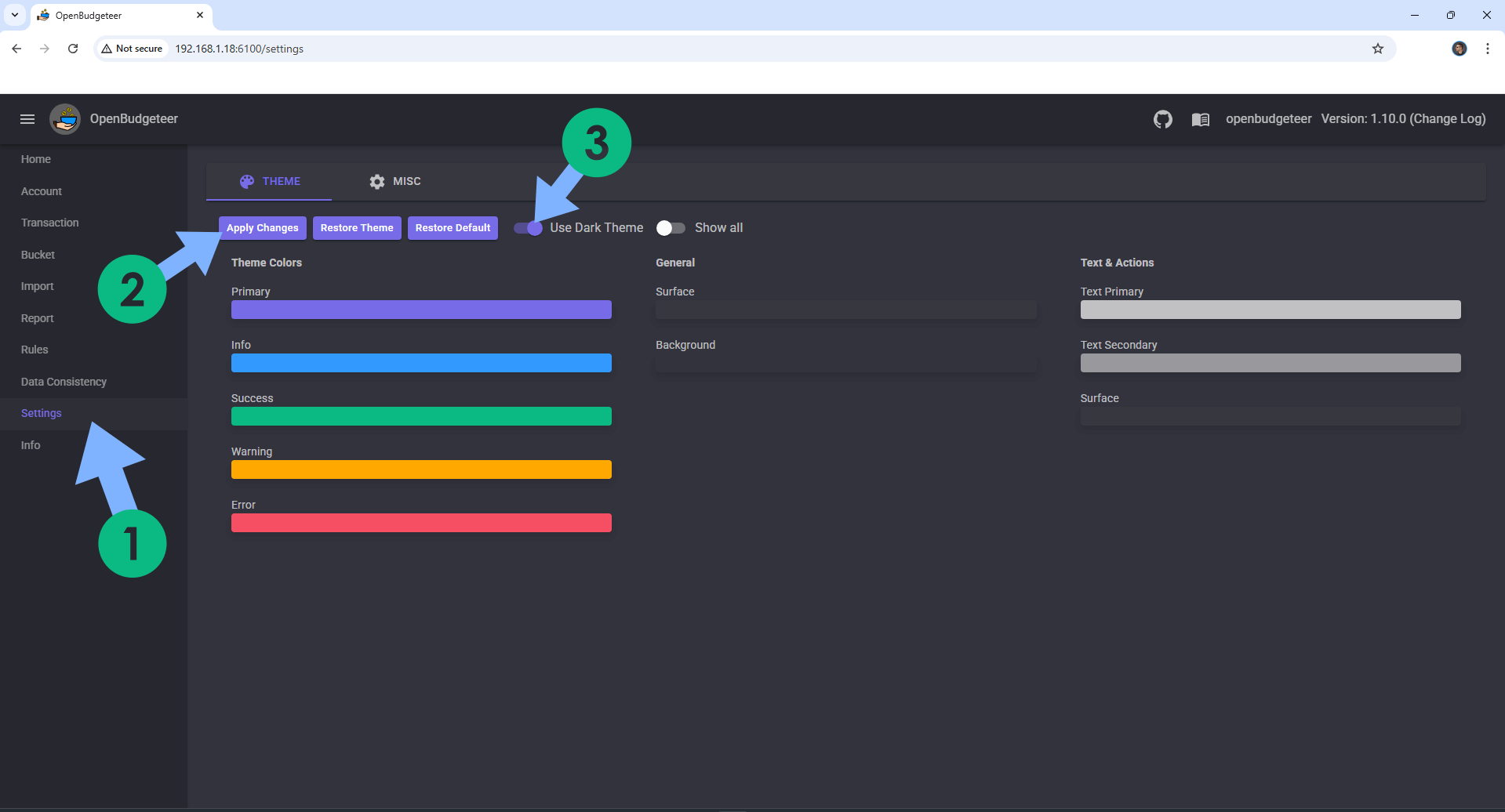
STEP 12
Your OpenBudgeteer dashboard at a glance! You can easily import transactions from your Online Banking account. OpenBudgeteer support CSV files.
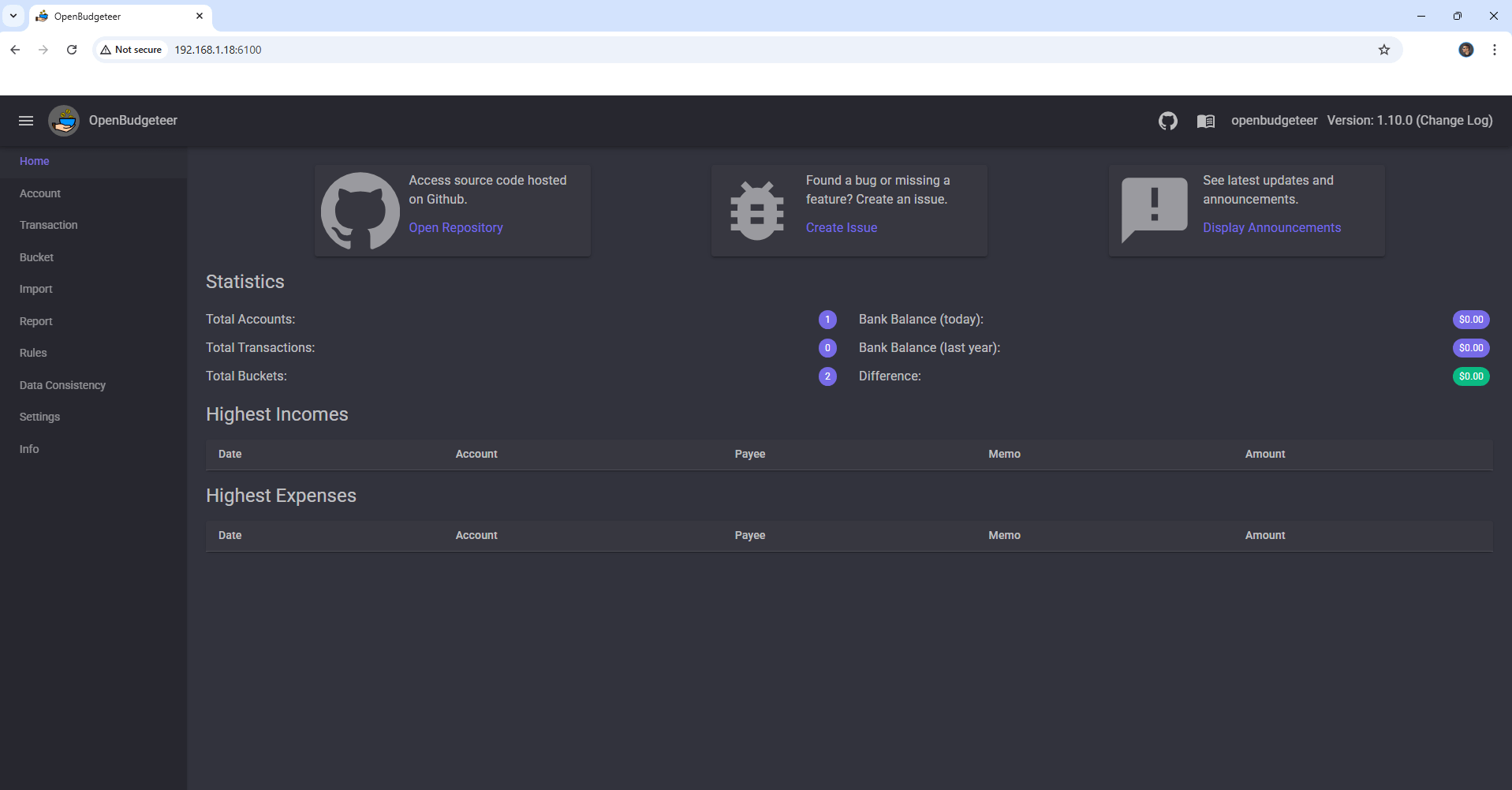
Enjoy OpenBudgeteer!
If you encounter issues by using this container, make sure to check out the Common Docker issues article.
Note: If you want to run the OpenBudgeteer container over HTTPS, check How to Run Docker Containers Over HTTPS. In order to make OpenBudgeteer work via HTTPS, it’s mandatory to activate WebSocket.
Note: Can I run Docker on my Synology NAS? See the supported models.
Note: How to Back Up Docker Containers on your Synology NAS.
Note: Find out how to update the OpenBudgeteer container with the latest image.
Note: How to Free Disk Space on Your NAS if You Run Docker.
Note: How to Schedule Start & Stop For Docker Containers.
Note: How to Activate Email Notifications.
Note: How to Add Access Control Profile on Your NAS.
Note: How to Change Docker Containers Restart Policy.
Note: How to Use Docker Containers With VPN.
Note: Convert Docker Run Into Docker Compose.
Note: How to Clean Docker.
Note: How to Clean Docker Automatically.
Note: Best Practices When Using Docker and DDNS.
Note: Some Docker Containers Need WebSocket.
Note: Find out the Best NAS Models For Docker.
Note: Activate Gmail SMTP For Docker Containers.
This post was updated on Thursday / February 5th, 2026 at 5:37 PM
